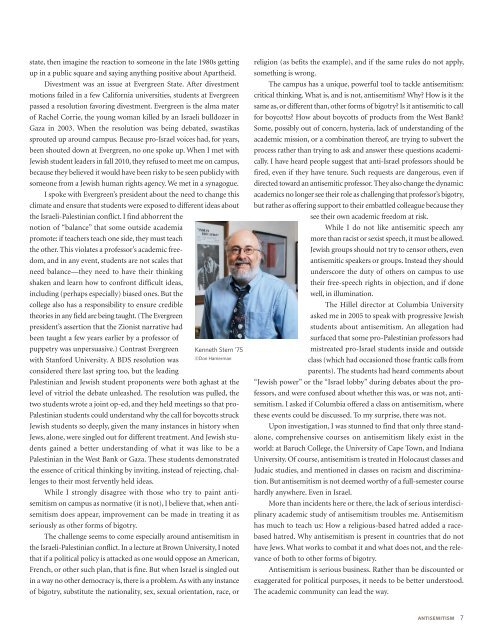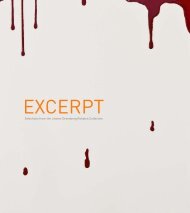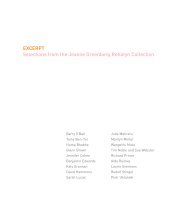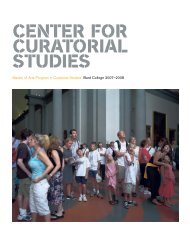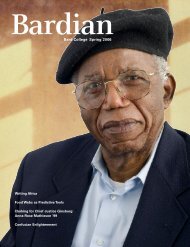Bardian SPRING 2011
Create successful ePaper yourself
Turn your PDF publications into a flip-book with our unique Google optimized e-Paper software.
state, then imagine the reaction to someone in the late 1980s getting<br />
up in a public square and saying anything positive about Apartheid.<br />
Divestment was an issue at Evergreen State. After divestment<br />
motions failed in a few California universities, students at Evergreen<br />
passed a resolution favoring divestment. Evergreen is the alma mater<br />
of Rachel Corrie, the young woman killed by an Israeli bulldozer in<br />
Gaza in 2003. When the resolution was being debated, swastikas<br />
sprouted up around campus. Because pro-Israel voices had, for years,<br />
been shouted down at Evergreen, no one spoke up. When I met with<br />
Jewish student leaders in fall 2010, they refused to meet me on campus,<br />
because they believed it would have been risky to be seen publicly with<br />
someone from a Jewish human rights agency. We met in a synagogue.<br />
I spoke with Evergreen’s president about the need to change this<br />
climate and ensure that students were exposed to different ideas about<br />
the Israeli-Palestinian conflict. I find abhorrent the<br />
notion of “balance” that some outside academia<br />
promote: if teachers teach one side, they must teach<br />
the other. This violates a professor’s academic freedom,<br />
and in any event, students are not scales that<br />
need balance—they need to have their thinking<br />
shaken and learn how to confront difficult ideas,<br />
including (perhaps especially) biased ones. But the<br />
college also has a responsibility to ensure credible<br />
theories in any field are being taught. (The Evergreen<br />
president’s assertion that the Zionist narrative had<br />
been taught a few years earlier by a professor of<br />
puppetry was unpersuasive.) Contrast Evergreen Kenneth Stern ’75<br />
with Stanford University. A BDS resolution was<br />
©Don Hamerman<br />
considered there last spring too, but the leading<br />
Palestinian and Jewish student proponents were both aghast at the<br />
level of vitriol the debate unleashed. The resolution was pulled, the<br />
two students wrote a joint op-ed, and they held meetings so that pro-<br />
Palestinian students could understand why the call for boycotts struck<br />
Jewish students so deeply, given the many instances in history when<br />
Jews, alone, were singled out for different treatment. And Jewish students<br />
gained a better understanding of what it was like to be a<br />
Palestinian in the West Bank or Gaza. These students demonstrated<br />
the essence of critical thinking by inviting, instead of rejecting, challenges<br />
to their most fervently held ideas.<br />
While I strongly disagree with those who try to paint antisemitism<br />
on campus as normative (it is not), I believe that, when antisemitism<br />
does appear, improvement can be made in treating it as<br />
seriously as other forms of bigotry.<br />
The challenge seems to come especially around antisemitism in<br />
the Israeli-Palestinian conflict. In a lecture at Brown University, I noted<br />
that if a political policy is attacked as one would oppose an American,<br />
French, or other such plan, that is fine. But when Israel is singled out<br />
in a way no other democracy is, there is a problem. As with any instance<br />
of bigotry, substitute the nationality, sex, sexual orientation, race, or<br />
religion (as befits the example), and if the same rules do not apply,<br />
something is wrong.<br />
The campus has a unique, powerful tool to tackle antisemitism:<br />
critical thinking. What is, and is not, antisemitism? Why? How is it the<br />
same as, or different than, other forms of bigotry? Is it antisemitic to call<br />
for boycotts? How about boycotts of products from the West Bank?<br />
Some, possibly out of concern, hysteria, lack of understanding of the<br />
academic mission, or a combination thereof, are trying to subvert the<br />
process rather than trying to ask and answer these questions academically.<br />
I have heard people suggest that anti-Israel professors should be<br />
fired, even if they have tenure. Such requests are dangerous, even if<br />
directed toward an antisemitic professor. They also change the dynamic:<br />
academics no longer see their role as challenging that professor’s bigotry,<br />
but rather as offering support to their embattled colleague because they<br />
see their own academic freedom at risk.<br />
While I do not like antisemitic speech any<br />
more than racist or sexist speech, it must be allowed.<br />
Jewish groups should not try to censor others, even<br />
antisemitic speakers or groups. Instead they should<br />
underscore the duty of others on campus to use<br />
their free-speech rights in objection, and if done<br />
well, in illumination.<br />
The Hillel director at Columbia University<br />
asked me in 2005 to speak with progressive Jewish<br />
students about antisemitism. An allegation had<br />
surfaced that some pro-Palestinian professors had<br />
mistreated pro-Israel students inside and outside<br />
class (which had occasioned those frantic calls from<br />
parents). The students had heard comments about<br />
“Jewish power” or the “Israel lobby” during debates about the professors,<br />
and were confused about whether this was, or was not, antisemitism.<br />
I asked if Columbia offered a class on antisemitism, where<br />
these events could be discussed. To my surprise, there was not.<br />
Upon investigation, I was stunned to find that only three standalone,<br />
comprehensive courses on antisemitism likely exist in the<br />
world: at Baruch College, the University of Cape Town, and Indiana<br />
University. Of course, antisemitism is treated in Holocaust classes and<br />
Judaic studies, and mentioned in classes on racism and discrimination.<br />
But antisemitism is not deemed worthy of a full-semester course<br />
hardly anywhere. Even in Israel.<br />
More than incidents here or there, the lack of serious interdisciplinary<br />
academic study of antisemitism troubles me. Antisemitism<br />
has much to teach us: How a religious-based hatred added a racebased<br />
hatred. Why antisemitism is present in countries that do not<br />
have Jews. What works to combat it and what does not, and the relevance<br />
of both to other forms of bigotry.<br />
Antisemitism is serious business. Rather than be discounted or<br />
exaggerated for political purposes, it needs to be better understood.<br />
The academic community can lead the way.<br />
antisemitism 7


